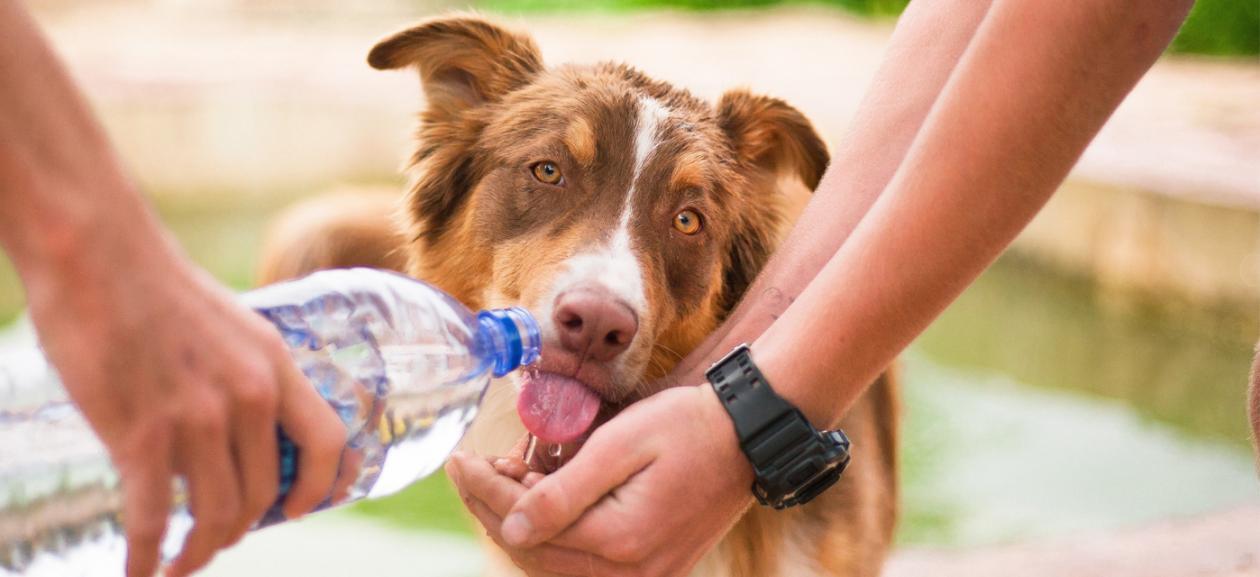
Tips for Keeping Your Pets Safe in Hot Weather
We all love spending the sunny days of summer outside with our furry friends, but enjoying the hotter weather can be dangerous. As temperatures start to rise, pet owners should pay special attention to their pets to understand their limitations and take extra precautions in this warmer weather so your fun day in the sun doesn't turn into a trip to the emergency room.

Tips for keeping dogs and cats safe in extreme heat:
- Never leave your pet in a car. On a mild to hot day, temperatures in a closed car (even with the windows cracked) can exceed 120 degrees in minutes, creating a very dangerous condition for any animal. Cracking a window or parking in the shade does not help.
- Give your pet extra water. Staying hydrated is crucial on hot days to avoid illness. Whether your pet is indoors or outdoors, be sure to fill their water bowls several times a day.
- Protect your pet’s paws from hot surfaces. Walk your pet in the grass or the shade whenever possible. A quick tip: if the pavement is too hot for your bare hands or feet, it’s too hot for your pet’s paws. If you need to take them outside to do their business, try wetting the surface with a hose or water bottle to help make it a little cooler for them.
- Don’t overdo outdoor exercise. Oftentimes, dogs don’t know when they need a break, so it’s important to stop frequently for shaded breaks and offer plenty of water.
- Take extra care with older dogs and dogs with shorter noses. Just like older humans, older dogs can be especially susceptible to higher temperatures. And certain breeds with shorter noses (like pugs and bulldogs) are at a greater risk of heatstroke.
- Apply pet-safe sunscreen to your dog. Sunburn can affect pets the same way it affects humans – pain, peeling, and skin cancer. Use a pet-safe sunscreen on unprotected areas, like the tips of the ears, the skin around the lips, and the tip of the nose. A good rule of thumb for sunscreen: If it’s safe for babies, it’s safe for your pets.
- Don’t leave windows open while you’re pets are unattended. Don’t rely on window screens to keep your pet from falling.
- When in doubt, stay indoors. Avoid being outside for long periods of time during the hottest time of the day, 10 a.m. to 5 p.m. Take walks earlier in the morning to avoid as much of the heat as you can. Animals can get sick quickly on hot days, even if they are in the shade.
Download Warm Weather InfoGraphic
Download Warm Weather Social media infographic
Signs of heatstroke in dogs and cats:
Heatstroke can be fatal if not treated quickly. Signs of heatstroke include:
- Panting
- Vomiting
- Excessive drooling
- Warm and dry skin
- Rapid heartbeat
- Staring or anxious expressions
- Uncoordinated movements or collapse
What should you do if they exhibit signs?
Owners who suspect their pet may be experiencing heatstroke should call their regular veterinarian or DoveLewis immediately at 503-228-7281. In the meantime, you can:
- Lower your pet’s body temperature by applying towels soaked in cool water to the hairless areas of the pet’s body (the tips and back of the ears, foot pads, belly, and inner thighs). Do NOT use ice or extremely cold water because that can worsen the problem.
- Use a fan to help cool the animal. Even if the pet seems to cool down, it’s still imperative to visit a veterinarian immediately, as temperatures often spike again or cool below a safe, normal temperature.
Please note: Avoid completely immersing a pet in water, since heat cannot leave the body as effectively in this situation, and extreme changes in body temperature are dangerous to the pet’s health.
Do you have urban farm animals – chickens, rabbits, goats or sheep?
Learn how to help them beat the heat »
It's the law: Good Samaritans can break car windows to rescue animals and children
A law went into effect (HB 2732) that allows people to break into a car to save an unattended animal or child who appears to be in imminent danger. In 95-degree weather, the inside of a car can reach 114 degrees in less than 10 minutes and 129 degrees in 30 minutes. An animal or child in this situation could suffer heatstroke, which can be fatal, in just minutes. Cracking windows and parking in the shade does not help in warmer weather. Good Samaritans who choose to rescue an animal or child must call law enforcement prior to breaking in and must stay near the car with the animal or child until the police arrive at the scene.
Recent Posts
Marijuana Toxicity in Pets: What You Need to Know
As availability of marijuana increases in the Portland area since legalization, so have the number of marijuana toxicity cases treated at DoveLewis. Our doctors warn pet owners of the potential risks to their dogs and cats if marijuana is ingested in any form.
Dog Bite Prevention Tips
Now more than ever, people are venturing outside with their pets to get fresh air. This is increasing the possibility of interactions with other dogs that can lead to bites and injuries. DoveLewis is sharing tips to help prevent this from happening so animals and humans can stay safe.
How to Build a Pet First Aid Kit
Every pet owner should have a pet first aid kit handy in case of an emergency. If you need to put one together, we’ve got you covered!





